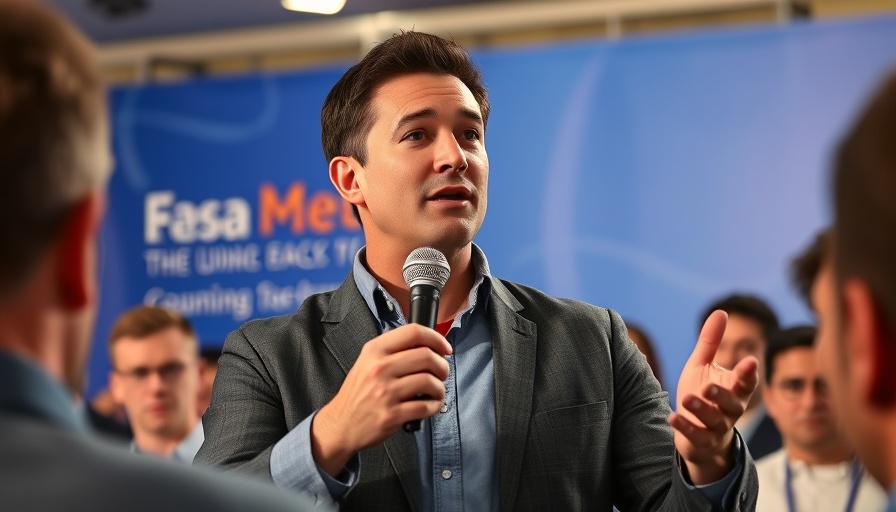
The Evangelistic Heart: A Modern Approach to Age-Old Truths
In the ever-evolving landscape of church culture, there lies a beautiful and necessary balance between tradition and contemporary relevance. The recent short clip titled Watch Him Evangelize captures this essence beautifully, as it showcases an evangelistic fervor grounded in clear biblical thinking—an essential for any congregation seeking to make an impact today.
The video Watch Him Evangelize presents a compelling view on evangelism, encouraging a deeper consideration of how clear biblical thinking can enhance outreach efforts.
Understanding Evangelism in a Changing World
At its core, evangelism is about sharing the gospel, the 'good news' of Jesus Christ. As churches today face rapidly changing social environments and diverse worldviews, the importance of evangelizing effectively becomes crucial. Evangelism isn’t merely about influencing others; it’s about connecting deeply with people’s lives while upholding biblical truths. Evangelists like those portrayed in Watch Him Evangelize are examples of how passionate speaking can guide others toward a meaningful understanding of faith.
The Power of Clarity in Communication
One aspect that stands out in the video is the clear communication style of the evangelist. Emotional stories, engaging language, and relatable illustrations can transform abstract truths into compelling narratives. This approach resonates, especially in contemporary settings where people crave authenticity and relevance. Historical context also plays a significant role; understanding the social and cultural backdrops of the biblical times enhances our interpretation and application of scripture today.
Creating Connections: The Why Behind Evangelism
In a society increasingly marked by individualism and disconnection, clear biblical thinking allows congregations to address real-world issues that resonate with people’s everyday experiences. The evangelistic efforts shown in the video remind us of the importance of connecting with others in genuine ways. When the church approaches evangelism as a heart of service, it transforms outreach from a duty to a joy. This vision aligns perfectly with the teachings of John Piper, who often emphasizes viewing the gospel as not only a message but a compassionate call to embrace those around us.
Lessons from Salt Church Los Montesinos and Beyond
Drawing inspiration from contemporary congregations, such as Salt Church Los Montesinos and Walton Evangelical Church, we see innovative ways of approaching evangelism. These churches engage with cultural tools to foster connections and share biblical teachings. By leveraging community stories and relatable, practical insights, they build congregational identity that appeals to both young and older generations. This engagement aligns with the message from Watch Him Evangelize that effective communication and genuine enthusiasm can foster growth and understanding.
Navigating Common Misconceptions in Evangelism
Despite its importance, evangelism is often misunderstood. Some may perceive it as intrusive or outdated. However, the video challenges these misconceptions by showcasing the warmth and happiness of sharing faith. It’s crucial for churches to educate their members on the authentic nature of evangelism—that it involves building relationships rather than merely ticking off boxes or making sales. With clear biblical thinking, representatives of the church can bring hope to the conversations that shape our lives.
The Future of Evangelism: Predictions and Insights
Looking ahead, the landscape of evangelism and church involvement will likely continue to evolve. As technology permeates daily life, innovative approaches to sharing the gospel, such as online platforms and social media, will play an ever-bigger role. With accessibility comes responsibility; clear biblical content, presented lovingly and authentically, will ensure that the message remains true even as the methods of outreach innovate. The adaptability showcased in the Watch Him Evangelize clip serves as a reminder of the dynamic nature of faith—rooted in history yet radically evolving.
Connecting the Dots: Bringing it All Together
The themes presented in the video echo the vital importance of having clear, biblical thinking when addressing church issues. By adhering to this principle, congregations, whether in Salt Church Mar Menor or elsewhere, can flourish in their outreach. The theological teachings provided by figures like John Piper emphasize that every conversation offers an opportunity for connection, and these opportunities are foundational to the evangelistic mission. The genuine enthusiasm in the video propels momentum for personal and communal growth.
To embody the essence of evangelism is to embrace storytelling that resonates with the heart, permeating both traditional and contemporary settings. As we reflect on these insights, we are called not to merely keep the message of Christ but to passionately share it within our communities.
 Add Row
Add Row  Add
Add 








Write A Comment